We may not have the course you’re looking for. If you enquire or give us a call on +32 35001305 and speak to our training experts, we may still be able to help with your training requirements.
Training Outcomes Within Your Budget!
We ensure quality, budget-alignment, and timely delivery by our expert instructors.
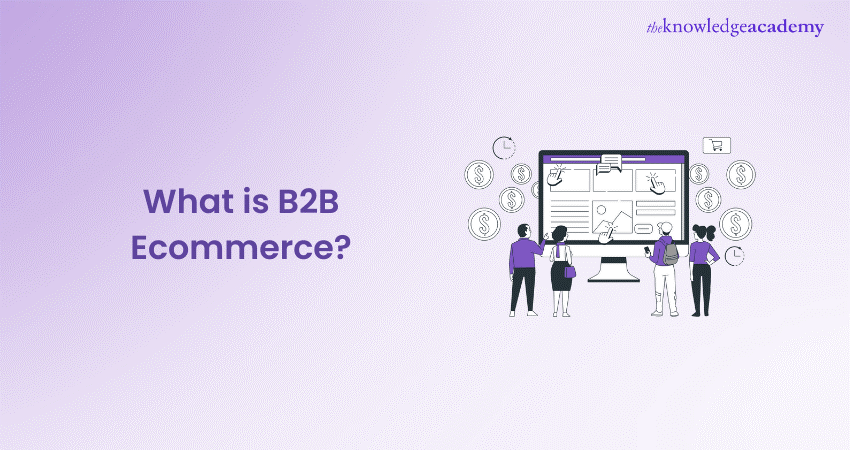
What is B2B Ecommerce? It’s more than just a buzzword; it’s a transformative force reshaping how businesses buy and sell to each other. As the digital domain evolves, understanding What is B2B Ecommerce becomes crucial for companies seeking to reorganise operations, reach new markets, and improve customer experiences. This dynamic model connects businesses directly, automating transactions and reducing costs.
This blog will demystify the concept, exploring its unique characteristics, benefits, and challenges. By understanding the nuances of B2B Ecommerce, businesses can leverage online channels to reach new customers, streamline operations, and drive growth. Let's delve into the world of B2B Ecommerce and discover how it can transform your business.
Table of Contents
1) What is B2B Ecommerce?
2) How Does B2B Ecommerce work?
3) Types of B2B Ecommerce
4) B2B Ecommerce Marketing Strategies
5) Stages of a B2B Business Lifecycle
6) B2B Ecommerce Examples
7) Conclusion
What is B2B Ecommerce?
B2B Ecommerce, or Business-to-Business Ecommerce, refers to the online sale of products, services, or information between businesses rather than between a business and individual consumers. Unlike Business-to-Consumer (B2C), B2B transactions involve larger order volumes, complex negotiations, and longer sales cycles.
B2B Ecommerce platforms facilitate these transactions by providing a digital marketplace where companies can showcase their offerings, manage orders, and streamline the purchasing process. B2B Ecommerce is essential for manufacturers, wholesalers, distributors, and other companies that sell directly to other businesses.
By moving their operations online, these companies can reach a wider audience, automate their sales processes, and improve efficiency. Whether it’s simplifying order management, offering personalised pricing, or integrating with existing business systems, B2B Ecommerce provides an abundance of openings for growth and expansion.
How Does B2B Ecommerce Work?
B2B Ecommerce operates on digital platforms where businesses list their products or services, and other companies can browse, place orders, and make payments. The process begins when a buyer searches for a product or service on a B2B marketplace, company website, or Ecommerce platform. Once they find what they need, they can request a quote, negotiate terms, or place an order directly through the platform.
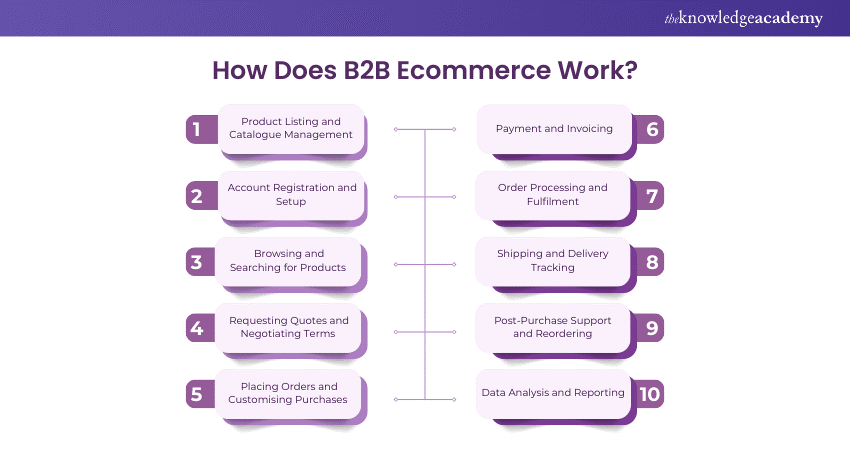
The transaction process often involves multiple stages, including approval workflows, custom pricing, and bulk ordering options tailored to the buyer’s needs. Payments can be made through various methods such as credit cards, bank transfers, or credit terms set up between the businesses.
Many B2B platforms also integrate with Enterprise Resource Planning (ERP) and Customer Relationship Management (CRM) systems, ensuring seamless order processing, inventory management, and customer support.
Types of B2B Ecommerce
B2B Ecommerce encompasses various models that cater to different business structures and needs. Understanding the types can help organisations choose the right approach to maximise their online sales potential.
Manufacturer
Manufacturers, for example, produce products in bulk and then sell them to wholesalers or distributors or they purchase materials from other businesses. With B2B Ecommerce, manufacturers can manage their supply chains effectively, cut down on operational costs and directly reach their buyers without any intermediaries.
This usually involves buying in bulk, intricate pricing strategies so for this transaction to happen, a B2B platform would be the best of all.
Distributor
Distributors serve as the intermediaries between manufacturers and retailers or other businesses. They buy products from manufacturers and sell them to businesses that use them.
For this, B2B Ecommerce allows the distributors to offer their clients online catalogues and a more straightforward buying experience including offering personalised pricing. Digitisation helps distributors to reach a larger audience, gain better control over inventory and delight customers just like in any other industry.
B2B2C
Business-to-Business-to-Consumer (B2B2C) builds on the two previous models by integrating features of them, enabling businesses to sell directly from their organisation through a business.
For instance, a manufacturer might sell its products to another who sells directly to the end consumer through an online platform. Through this model, companies now open up consumer markets, still maintain their B2B networks and have an extended reach not to mention additional revenue.
Wholesale
Wholesale businesses sell products in bulk at lower prices per unit to retailers, other wholesalers or B2B (business-to-business) customers. A major chunk of these would be operated with the help of B2B Ecommerce platforms as they need powerful systems in place to efficiently deal with large orders, price negotiations and flexible payment terms. These online systems also simplify the process for companies to purchase, starting from product selection and working its way right through the buying cycle until fulfillment of orders–a practical tool in inventory management that is beneficial for growing market share.
Explore Shopify's features and build your online presence with expert guidance in our Introduction To Shopify – join now!
B2B Ecommerce Marketing Strategies
Effective marketing strategies are essential for any B2B Ecommerce business looking to attract and retain clients. With an ever-growing number of businesses competing in the digital space, standing out requires a well-crafted approach that combines visibility, engagement, and targeted communication. Below are key strategies that can help you excel in the competitive B2B market.
Utilising SEO
One of the must-haves for B2B Ecommerce marketing strategies is Search Engine Optimisation (SEO). SEO means you make your website appear at the top of Search Engine Results Pages (SERPs), making it easy for your target audience to find what they are looking for, whether it's products or services.
Simultaneously, prioritise doing keyword research to establish what your target market is searching for. Include these keywords naturally in your website content, product descriptions, and metadata.
You also need to generate high-quality content, such as blogs, whitepapers, and case studies, specifically looking at the sorts of pain points that are front-of-mind for your industry; this will both position you as a thought leader in the mind of potential clients and drive more organic traffic.
Apart from that, technical SEO elements (making site speed better, mobile-friendly sites, or getting a secure HTTPS website) are useful for creating an excellent user experience and helping to improve your rankings. By frequently measuring and analysing your SEO results with services similar to Google Analytics, you can continue growing visibility, which increases traffic on a long-term basis.
Social Media Tactics
While social media is often linked to B2C marketing, it can offer just as much (and at times more) value for those involved in B2B Ecommerce. Any of those platforms, or you can use them all—the power to build your brand, relationships, and inquire leads directly from LinkedIn, Twitter, and Facebook. This is particularly significant if you are running a B2B start-up; LinkedIn (specifically) can be the next big thing for you in terms of connecting with decision-makers, thought leaders, and potential customers.
Share articles of interest, comment on posts within your industry, and join groups that are relevant to give off the impression that you have become an expert in a hollow field.
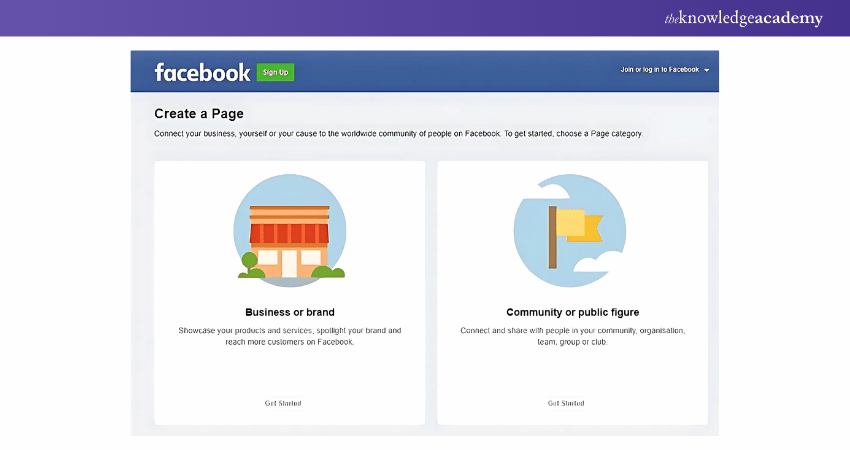
Use social media to distribute user-centric content (webinars, infographics, testimonies, and industry news). Robust audience engagement—by responding to comments, getting into discussions with users, and even starting polls/Q&A sessions—you can keep your viewers active.
Paid social advertising through channels like LinkedIn Sponsored Content or Facebook Ads can target via industry, job role, and company size to get your message in front of the right eyes. An engaging social media presence will help you build brand awareness, engagement, and get people to your Ecommerce site.
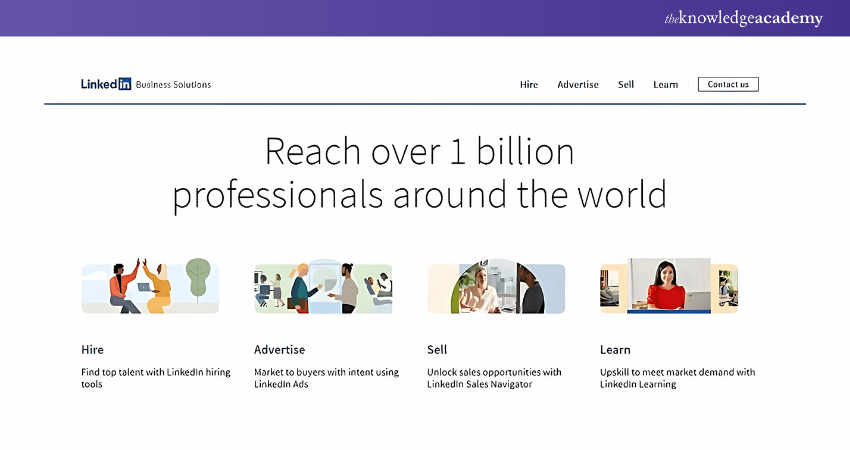
Leveraging Paid Advertising
Paid advertising, including Google Ads, LinkedIn Ads, and display advertising, can be a highly effective way to reach your target audience with precision. Pay-Per-Click (PPC) campaigns allow you to bid on keywords relevant to your business, ensuring your ads appear at the top of search results when potential clients are looking for your products or services. Display ads, which appear on websites within your target audience’s browsing habits, help increase brand awareness and keep your company top-of-mind.
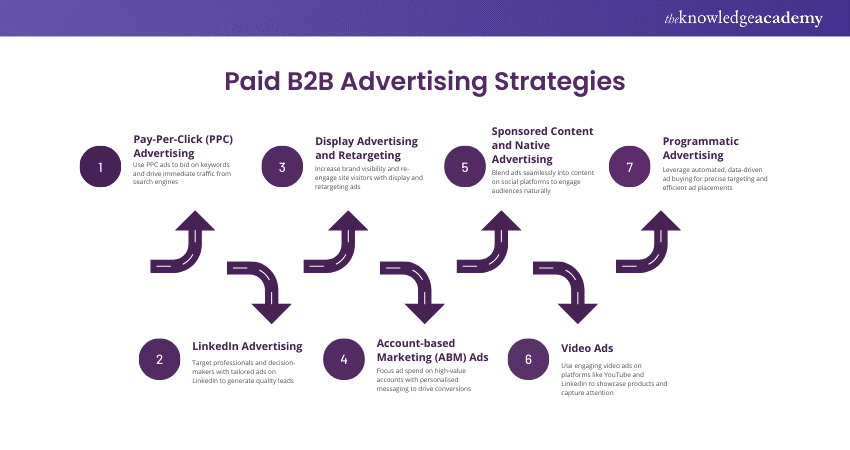
For B2B Ecommerce, it’s important to tailor your paid advertising campaigns to the specific needs of your audience. Use analytics to identify high-performing keywords, track conversion rates, and refine your targeting to focus on decision-makers and influencers within your niche.
Retargeting ads, which display to users who have previously visited your site, can be particularly effective in reminding potential clients of your offerings and encouraging them to return and complete a purchase. Investing in paid advertising with a strategic, data-driven approach can lead to significant increases in traffic and conversions.
Unlock the secrets to Ecommerce success with our Ecommerce Strategy Course and elevate your digital business strategy today!
Optimising Conversion Rates
Conversion Rate Optimisation (CRO) is the process of enhancing your website to turn visitors into customers. For B2B Ecommerce, CRO involves a deep understanding of your buyers’ journey and removing any obstacles that may prevent them from making a purchase. Simplify the purchasing process by reducing the number of steps required to place an order and ensuring your checkout process is straightforward and user-friendly.
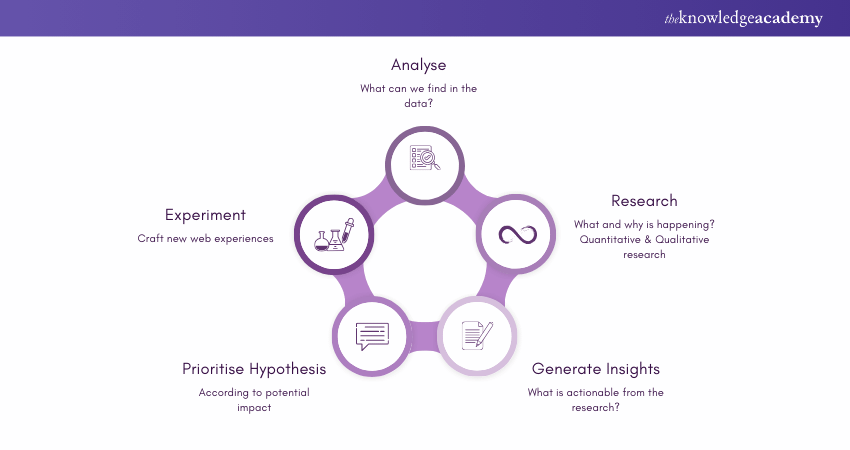
Enhancing product pages with detailed descriptions, clear images, and specifications can help answer questions and build buyer confidence. Implement strong calls-to-action (CTAs) that guide users towards desired actions, such as “Request a Quote” or “Contact Sales.” Use A/B testing to experiment with different page elements—like button colours, headlines, and page layouts—to identify what drives the highest conversion rates.
Tools like heatmaps can show you where users are clicking on your site, helping you make data-driven improvements to your design and layout. By continually optimising your website for conversions, you can maximise your return on marketing investments.
Customisation and Personalisation
B2B buyers expect a tailored experience that meets their unique needs. Customisation and personalisation strategies help create a more relevant and engaging buyer journey. Use data analytics to understand your clients’ preferences, purchase history, and browsing behaviours. Based on this data, offer personalised product recommendations, custom pricing, and targeted marketing messages that speak directly to each client’s needs.
For example, you can use Account-Based Marketing (ABM) to target high-value clients with bespoke content and offers. Personalised email campaigns that address specific challenges or interests can also enhance engagement and drive sales.
The ability to personalise quotes, suggest complementary products, and provide tailored support sets your business apart from competitors and strengthens client relationships. By focusing on personalisation, you not only improve the buyer experience but also foster loyalty and increase the likelihood of repeat business.
Learn to build, manage, and optimise your WooCommerce store with our comprehensive, hands-on WooCommerce Training – sign up now!
Stages of a B2B Business Lifecycle
Understanding the stages of a B2B business lifecycle helps companies navigate challenges and capitalise on opportunities as they grow. Here’s a look at the key stages:
Startup
During the startup phase, businesses focus on building their brand, developing a product or service, and establishing an online presence. This stage involves a lot of experimentation and learning, as companies refine their offerings and identify their target market. B2B Ecommerce platforms play a crucial role in launching new products and reaching initial customers.
Growth
In the growth stage, businesses begin to scale their operations and increase their market share. The focus shifts to optimising the sales process, expanding product lines, and improving customer retention. B2B Ecommerce platforms can support this growth by providing tools for inventory management, customer engagement, and sales automation.
Expansion
Expansion involves entering new markets, diversifying the product range, and enhancing the customer experience. This stage often requires significant investment in marketing, technology, and logistics. B2B companies can leverage Ecommerce platforms to explore international markets, offer multi-currency options, and cater to diverse customer needs.
Maturity
At the maturity stage, businesses aim to maintain market leadership and optimise their operations for maximum efficiency. The focus is on enhancing customer relationships, improving operational processes, and driving innovation. B2B Ecommerce platforms continue to play a critical role in automating workflows, integrating with existing systems, and providing valuable insights through data analytics.
Elevate your brand with advanced digital marketing tools with our Digital Marketing Tools Training – join now!
B2B Ecommerce Examples
Several companies have successfully implemented B2B Ecommerce models to streamline their operations and boost sales. Notable examples include:
a) Alibaba: As one of the world’s largest B2B Ecommerce platforms, Alibaba connects millions of buyers and suppliers across the globe. It offers a vast range of products, advanced search features, and secure payment options, making it a go-to platform for businesses seeking wholesale goods.
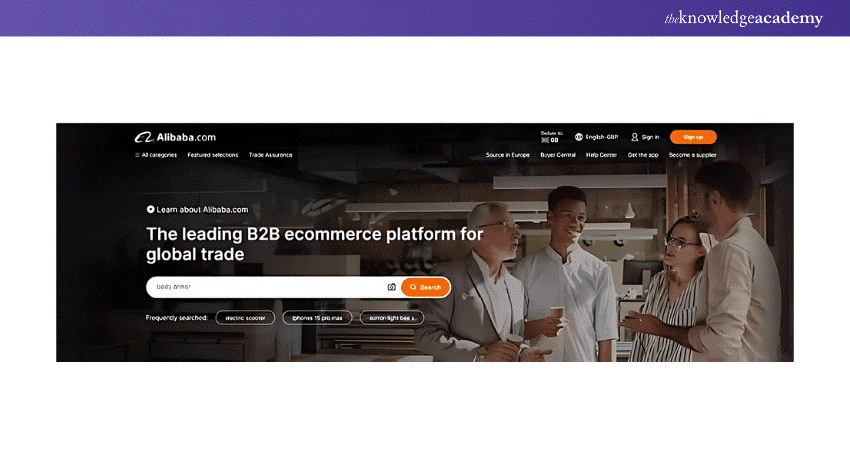
b) Grainger: A leading industrial supply company, Grainger uses its B2B Ecommerce site to offer an extensive product catalogue, personalised pricing, and advanced search functionality. The platform allows businesses to quickly find and order supplies, improving efficiency and customer satisfaction.
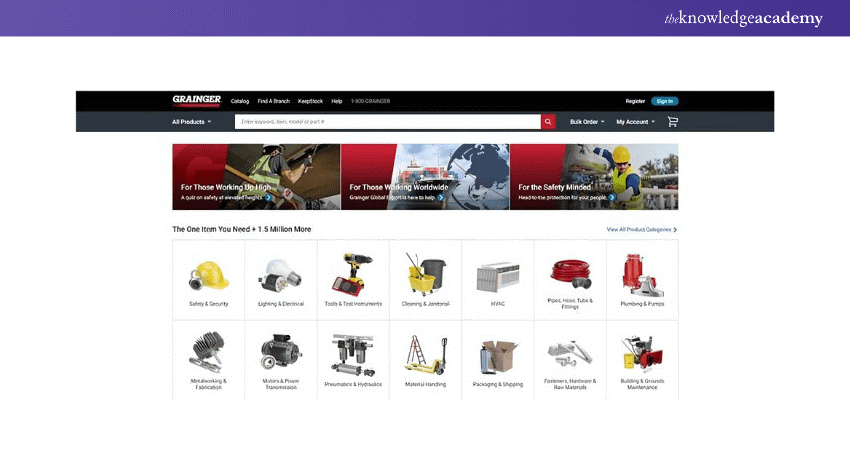
c) Amazon Business: Amazon’s B2B platform provides businesses with access to millions of products, bulk purchasing options, and tailored pricing. The platform’s robust logistics network and user-friendly interface make it a popular choice for companies looking to streamline their procurement processes.
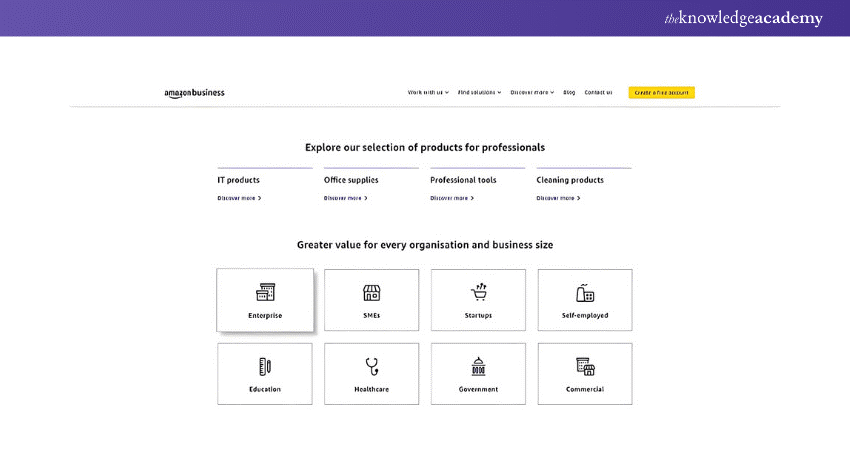
d) ThomasNet: ThomasNet is a leading B2B Ecommerce platform connecting buyers and suppliers in the industrial sector. It provides a comprehensive directory of manufacturers, distributors, and service providers, allowing businesses to source parts, materials, and products easily.
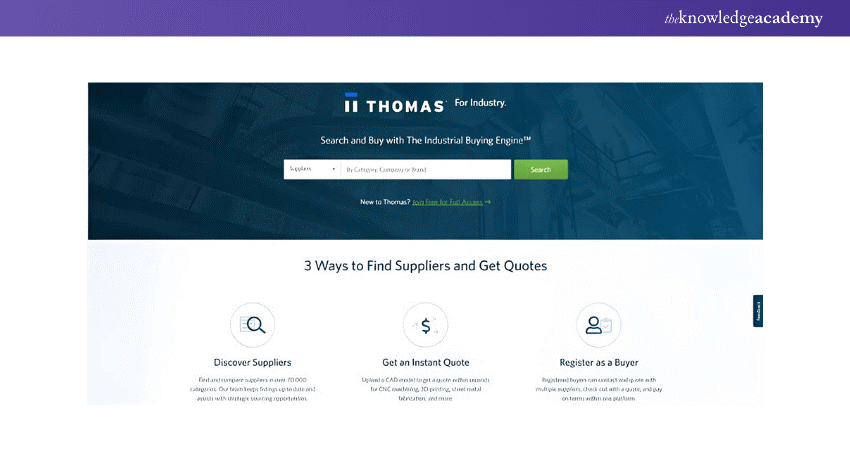
e) SAP Ariba: SAP Ariba is a global B2B marketplace that connects businesses with suppliers for procurement, sourcing, and supply chain management. It offers a comprehensive suite of tools for managing supplier relationships, streamlining procurement processes, and enhancing supply chain efficiency.
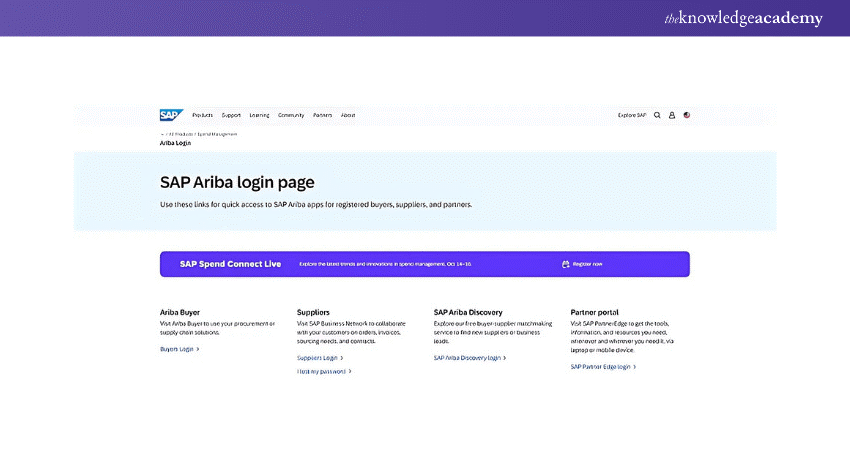
Elevate your Ecommerce success by mastering product content creation with our expert-led Product Content For E-Commerce Training today!
Conclusion
B2B Ecommerce is transforming the way businesses operate, offering new opportunities for growth, efficiency, and customer engagement. By leveraging digital platforms, companies can streamline their operations, reach new markets, and provide a seamless purchasing experience for their clients. Understanding the different types of B2B Ecommerce, implementing effective marketing strategies, and recognising the stages of the business lifecycle are all crucial steps to success in the B2B space.
Transform your career with cutting-edge Digital Marketing Courses that provide practical skills and real-world expertise!
Frequently Asked Questions

Ecommerce in B2B streamlines transactions between businesses, automates sales processes, enhances customer experiences, and expands market reach. It enables companies to efficiently manage orders, provide personalised pricing, and improve supply chain operations through digital platforms.

The main function of B2B is to facilitate commercial transactions between businesses, such as wholesalers, manufacturers, and retailers. B2B focuses on bulk sales, customised pricing, and long-term relationships to support business operations and supply chains.

The best B2B Ecommerce platform often depends on specific business needs, but Shopify Plus, Magento, and SAP Ariba are popular choices due to their scalability, customisation options, and robust integration capabilities tailored for B2B transactions.

The Knowledge Academy takes global learning to new heights, offering over 30,000 online courses across 490+ locations in 220 countries. This expansive reach ensures accessibility and convenience for learners worldwide.
Alongside our diverse Online Course Catalogue, encompassing 19 major categories, we go the extra mile by providing a plethora of free educational Online Resources like News updates, Blogs, videos, webinars, and interview questions. Tailoring learning experiences further, professionals can maximise value with customisable Course Bundles of TKA.

The Knowledge Academy’s Knowledge Pass, a prepaid voucher, adds another layer of flexibility, allowing course bookings over a 12-month period. Join us on a journey where education knows no bounds.

The Knowledge Academy offers various Digital Marketing Courses, including Ecommerce Strategy Course, Certified Artificial Intelligence (AI) For Digital Marketing Training, Product Content For Ecommerce Training and Pinterest Marketing Course. These courses cater to different skill levels, providing comprehensive insights into Dropshipping Tips.
Our Digital Marketing Blogs cover a range of topics related to Ecommerce, offering valuable resources, best practices, and industry insights. Whether you are a beginner or looking to advance your Digital Marketing skills, The Knowledge Academy's diverse courses and informative blogs have got you covered.
Upcoming Digital Marketing Resources Batches & Dates
Date
 Ecommerce Strategy Course
Ecommerce Strategy Course
Fri 28th Feb 2025
Fri 4th Apr 2025
Fri 27th Jun 2025
Fri 29th Aug 2025
Fri 24th Oct 2025
Fri 5th Dec 2025







 Top Rated Course
Top Rated Course



 If you wish to make any changes to your course, please
If you wish to make any changes to your course, please


